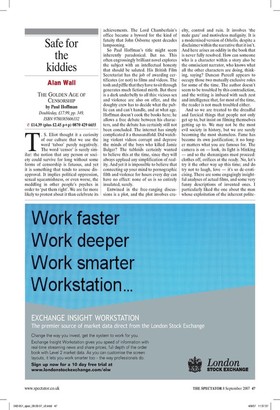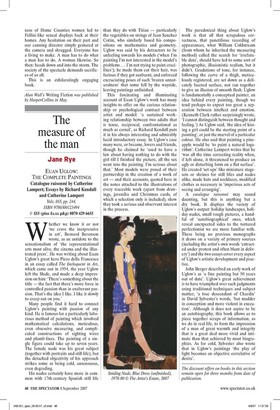Safe for the kiddies
Alan Wall THE GOLDEN AGE OF CENSORSHIP by Paul Hoffman Doubleday, E17.99, pp. 349, ISBN 9780385606332 £14.39 (plus £2.45 p+p) 0870 429 6655 T. S. Eliot thought it a curiosity of our culture that we use the word 'taboo' purely negatively. The word 'censor' is surely similar: the notion that any person or society could survive for long without some forms of censorship is fatuous, and yet it is something that tends to arouse disapproval. It implies political oppression, sexual squeamishness, or even worse, the meddling in other people's psyches in order to 'put them right'. We are far more likely to protest about it than celebrate its achievements. The Lord Chamberlain's office became a byword for the kind of fatuity that John Osborne spent decades lampooning.
So Paul Hoffman's title might seem inherently paradoxical. But no. This often engrossingly brilliant novel explores the subject with an intellectual honesty that should be saluted. His British Film Secretariat has the job of awarding certificates (or not) to films and videos. The tosh and piffle that they have to sit through generates much fictional mirth. But there is a dark underbelly to all this: vicious sex and violence are also on offer, and the doughty crew has to decide what the public can and can't handle, and at what age. Hoffman doesn't cook the books here; he allows a free debate between his characters, and the debate has certainly still not been concluded. The internet has simply complicated it a thousandfold. Did watching violent videos corrupt and deprave the minds of the boys who killed Jamie Bulger? The tabloids certainly wanted to believe this at the time, since they will always applaud any simplification of reality. And yet it is impossible to believe that connecting up your mind to pornographic filth and violence for hours every day can have no effect: none of us is so entirely insulated, surely.
Entwined in the free-ranging discussions is a plot, and the plot involves cruelty, control and ruin. It involves 'the male gaze' and motiveless malignity. It is a modernised version of Othello, despite a disclaimer within the narrative that it isn't. And here arises an oddity in the book that is never fully resolved. How can someone who is a character within a story also be the omniscient narrator, who knows what all the other characters are doing, thinking, saying? Duncan Purcell appears to occupy those two mutually exclusive roles for some of the time. The author doesn't seem to be troubled by this contradiction, and the writing is imbued with such zest and intelligence that, for most of the time, the reader is not much troubled either.
And so we are treated to the dreadful and farcical things that people not only get up to, but insist on filming themselves getting up to. We may not be the most evil society in history, but we are surely becoming the most shameless. Fame has become its own justification; it no longer matters what you are famous for. The camera is on — look, its light is blinking — and so the shenanigans must proceed: clothes off, orifices at the ready. No, let's try it the other way up this time; and do try not to laugh, love — it's so de-eroticising. There are some engagingly insightful analyses of actual films, and some very funny descriptions of invented ones. I particularly liked the one about the man whose exploitation of the inherent politeness of Home Counties women led to Fellini-like sexual displays back at their homes. Any hesitation on their part and our cunning director simply gestured at the camera and shrugged. Everyone has a living to make. A man has to do what a man has to do. A woman likewise. So then: heads down and into the storm. The society of the spectacle demands sacrifices of us all.
This is an exhilaratingly engaging book.
Alan Wall's Writing Fiction was published by HarperCollins in May.




































































 Previous page
Previous page